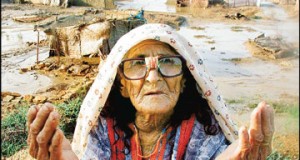There is a famous — probably the most famous — quote in relation to journalism written on a wall in Carroll Hall, the home of the School of Journalism and Mass Communication at the University of North Carolina at Chapel Hill. I would stare at it a few times while waiting for my class to begin but “the pen is mightier than the sword” never made much sense to me. How could words be stronger than bullets? The reason why the quote is so famous is because, I believe, that at least once in a journalist’s career, that saying comes to life.
On Saturday April 19, Hamid Mir, arguably Pakistan’s most influential and revered current affairs program host, was on his way to the port city of Karachi from Islamabad. He was coming to the headquarters for Geo News, the channel he works for, to host a special transmission on how a 100 days of no drones attacks in Pakistan had affected the on-going Taliban peace talks process. Mir, 48, is a larger-than-life journalist with a loud voice. He was the first to interview Osama bin Laden after 9/11 and also the first to interview Malala Yousafzai in Swat, bringing her and her cause to the forefront. I often joked with his program producer that he had the easiest job in the network. Any guest that needed to be called in for the talk show would readily agree to come to Mir’s eight o’clock, “Capital Talk” — the highest rated talk show on Pakistan’s most watched news channel.
The first time I met Mir, he didn’t know who I was or what I did at GEO News. Three years after graduating college, I was the producer of another show, based out of Karachi, and we were sent to Islamabad to conduct an exclusive interview. At the TV station’s bureau in Islamabad, I was avidly on the lookout for this celebrity journalist when I found him walking into the office. I said hello and smiled. He smiled back and that was that. I remember thinking that he was shorter than I imagined.
At 5:13 p.m. on April 19 this year, I was sitting in my car when I got a text message from Mir. Two years after our first hello, I had become Mir’s producer for special shows he hosted when he came to Karachi. We had been in contact over email and texting that week and on that Saturday, he was supposed to be in Karachi to host the program the following day. My phone pinged and the message read: “I’m attacked.” I stared at the phone quizzically wondering whether he had messaged by mistake or whether the IPhone’s over efficient spell checker had changed his words. I knew Mir was facing many death threats. It was common knowledge that the Pakistan Taliban hated him for his anti-Taliban stance. He is number one on their journalist hit list that had already rattled the media. In November 2012, a bomb was found under his car in Islamabad. At that point, he was facing the ire of the Taliban for supporting Malala Yousafzai after she was shot. The bomb was found and detonated. The Taliban later took responsibility for the attempted assassination. He also said that he faced internal threats — from elements within Pakistan’s Inter-services-intelligence (ISI) agency — who were unhappy with his coverage and programs on missing persons in Balochistan — an issue where the ISI has been allegedly said to be involved.
Recently, Mir had covered a more than 2,000 kilometer long march, led by a 72-year old activist and an 11-year old boy. Mama Qadeer Baloch and the young Ali Haider Baloch led a group of men and women in a non-violent march from Quetta, a city in the province of Balochistan, to the capital, Islamabad, which took five months to complete. Their demand was simple. They wanted the missing persons — the term used for the people reportedly picked up by the ISI — to be produced in court for trials. These missing persons, usually young Baloch men are allegedly abducted and tortured on suspicion of being separatists or working for “foreign elements” in the province. Many bodies have been found in unmarked graves in Balochistan over the years. The number of missing persons is said to be in the thousands. In March 2013, a commission on the inquiry of enforced disappearances said there were 621 missing persons in Balochistan. The Secretary of Defence in February 2014 told the Supreme Court, which had asked for a report on missing persons, that the number was 1,100. The Voice for Baloch Missing Persons, an organization set up by Mama Qadeer — dedicated to finding the missing persons –says the number ranges from 19,000 to 23,000. Mama Qadeer’s son was one of them until his mutilated body was found more than two years after he went missing. Mir faced immense pressure not to cover Mama Qadeer’s long march but he did so anyway. Geo News aired that episode despite intense pressure not to do so.
I called Mir after I saw his text message and he picked up, yelling, “They’re killing me, they’re killing me.” “Where are you, where are you?” I stammered. “I’m in Karachi,” he screamed, said a prayer, and hung up.
The feeling when the blood drains from your face is inexplicable to those who have never experienced it. I called my head of department and told him what had happened. Then I called another Geo News employee to find out who had gone to get Mir from Karachi airport. He replied that he was finding out because he had just heard the news. Mir had been shot six times, bullets ravaging his body, by armed men on two motorbikes and in a car. He was on his way to the office with one security guard and a driver in a Toyota Corolla car. He was about to message me to ask where the rundown meeting was taking place when the first bullet hit him. His driver and guard were unhurt and the driver sped off to the nearest hospital, the Aga Khan University Hospital followed by bullets, reaching the hospital safely where Mir underwent surgery. During the surgery, rumors spread that Mir was going to die — there was too much internal bleeding.
Today, as l think about that phone call, I remember hearing pain in Mir ‘s voice. I remember hearing panic. But I don’t recall hearing fear.
Mir had been cautious and he was prepared. He had, on two occasions, informed Amnesty International detailing the threats to his life. He had informed government officials, his colleagues and family that he was facing threats. Mir had written an email to the editorial board of his channel stating that if he was attacked and killed, the people responsible for his attack would include the Director General of the ISI, Lt. General Zaheer-ul-Islam.
While Mir was in surgery, his brother Amir Mir, a prominent print journalist, was on the phone. Mir’s channel, Geo News, were asking him questions on air in an audio interview about his brother’s condition and the threats to his life. Amir said that Mir had stated that if he was attacked and/or killed, the Director General of the ISI would be responsible. The news hit television screens in blazing red as Geo News ran pictures of Lt. General Zaheer-ul-Islam with Mir’s allegation, changing the course of history with one picture. Nobody had anticipated what was to follow.
Mir survived the attack and the doctors removed four bullets from his body, leaving two for later operations. A few days after his operation when I met him, he was in pain but in good spirits. He asked me whether we had done the transmission and I said it couldn’t be done without him. I joked that I now knew where he got his strength from — hinting at his strong and unwavering wife standing by his side. He chuckled and said that I didn’t know the half of it.
His wife isn’t the only one standing by him. After the news hit that Geo News and Mir’s brother had aired Mir’s statement citing that the Director General of the ISI was involved in Mir’s attempted killing, shock over the attack turned into menace over the allegation. Never before had the ISI or any of its high-ranking generals been so openly implicated in an attack on the media. The country was livid. How could a channel openly state that a general, and a patriot, was involved in attempted murder? Condolences turned into condemnations as other channels accused Geo News of pushing an anti-ISI agenda and it sparked a media outburst. After Mir’s successful surgery, his first statement was given to the media, read out by his brother, Amir. In the statement, Mir said that the ISI was annoyed after he did a show on Mama Qadeer Baloch’s long march. In his statement he said, “Men of some intelligence agency had come to my house, telling me that my name is on the hit-list… when I asked as to who had prepared the hit-list, the men gave no response.” He also said he faced threats from state and non-state actors. But the damage was done. Mir’s attack was forgotten and Geo News’ media trial for committing treason had begun.
In the past two weeks, GEO News has stood by its anchor as he recovers. Mir declined to record his statement to the Joint Investigation Team — which included a member of the ISI — saying his statement would include suspects in the ISI. He has recorded his statement to a judicial commission set up by the prime minister to investigate the attack. The White House has said they are closely watching developments in this case, as is the European Union. In Pakistan, from being a journalist who has been attacked for his stories, Mir has been labeled a traitor, and an Indian agent with an anti-Pakistan agenda. His channel faces the same allegation as the Defence Ministry has sent a notice to PEMRA — Pakistan’s Electronic Media Regulatory Authority to take action against GEO News for being “anti-state.”
Today, major news networks are hurling accusations against GEO News as traitors. Former cricketer-turned-politician, Imran Khan has joined this bandwagon and as also accused GEO News and its umbrella organization, the Jang Group (that publishes an English language newspaper, The News), for rigging Pakistan’s general elections in May 2013. He lost the election and his party Pakistan Tehreek-e-Insaaf was the runner-up to Prime Minister Nawaz Sharif’s ruling party, the Pakistan Muslim League-Nawaz. Today, because of the sudden growing and widespread notion that GEO has turned into a media organization of traitors, its employees are facing threats to their lives. Eight reporters and one anchor have been threatened, a cameraman has been beaten and out-stations as well as the main GEO News headquarters has been surrounded by protestors. The CEO of Network has also been accosted- his bullet-proof car window cracked with a heavy brick when he wasn’t in it. Female employees are being followed and verbally harassed with “You’re working for a traitor” slurs and the network’s vans and cars have been stripped of their colourful GEO News stickers. I asked our human resources department as well as the head of the out-station reporters whether anyone had decided to quit the media house because of the “traitor” onslaught. No one had wavered yet. Everyone was standing united with the organization.
However, it isn’t the same for the newbies who want to join The News — the Jang Group’s English newspaper. The lifestyle and fashion section was looking to hire a new reporter. A candidate was interviewed and given a job offer. She declined because her parents were “army supporters” and were not willing to let her work for the Jang Group.
As I recall the phrase I would read in Carroll Hall, I realize that the pen can survive, and overcome bullets — but in Pakistan, if you survive, the price is very high.
As for Hamid Mir, he is recovering from his wounds, gearing up for another fight to find his would-be assassins. Some say he has fallen in the eyes of Pakistanis for saying that elements in the ISI are responsible for his attack but others say that Mir stands high — and tall. He might have been short when I first met him but today, he is one of the tallest journalists I know. (Courtesy: http://www.huffingtonpost.com)
Marium Chaudhry is a senior producer for news and programming at GEO News in Karachi, Pakistan. She is a UNC-Chapel Hill graduate in broadcast journalism and international studies and a Fulbright-Hays scholar.
Follow Marium Chaudhry on Twitter: www.twitter.com/mariumch
Republished in the Balochistan Point on May 12, 2014
 Balochistan Point Voice of Nation
Balochistan Point Voice of Nation




